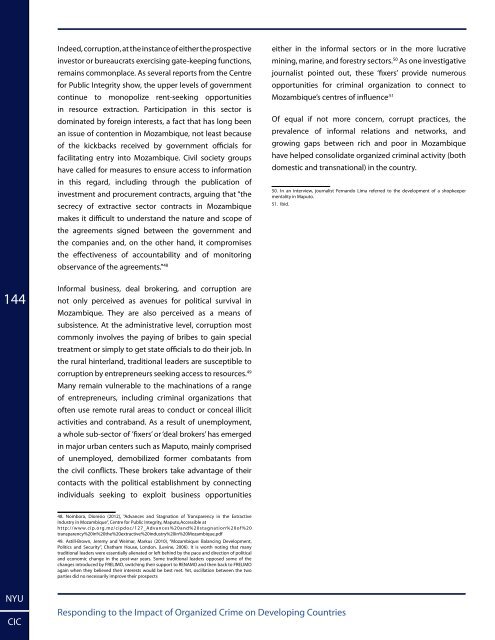here - Center on International Cooperation - New York University
here - Center on International Cooperation - New York University
here - Center on International Cooperation - New York University
Create successful ePaper yourself
Turn your PDF publications into a flip-book with our unique Google optimized e-Paper software.
Indeed, corrupti<strong>on</strong>, at the instance of either the prospective<br />
investor or bureaucrats exercising gate-keeping functi<strong>on</strong>s,<br />
remains comm<strong>on</strong>place. As several reports from the Centre<br />
for Public Integrity show, the upper levels of government<br />
c<strong>on</strong>tinue to m<strong>on</strong>opolize rent-seeking opportunities<br />
in resource extracti<strong>on</strong>. Participati<strong>on</strong> in this sector is<br />
dominated by foreign interests, a fact that has l<strong>on</strong>g been<br />
an issue of c<strong>on</strong>tenti<strong>on</strong> in Mozambique, not least because<br />
of the kickbacks received by government officials for<br />
facilitating entry into Mozambique. Civil society groups<br />
have called for measures to ensure access to informati<strong>on</strong><br />
in this regard, including through the publicati<strong>on</strong> of<br />
investment and procurement c<strong>on</strong>tracts, arguing that “the<br />
secrecy of extractive sector c<strong>on</strong>tracts in Mozambique<br />
makes it difficult to understand the nature and scope of<br />
the agreements signed between the government and<br />
the companies and, <strong>on</strong> the other hand, it compromises<br />
the effectiveness of accountability and of m<strong>on</strong>itoring<br />
observance of the agreements.” 48<br />
either in the informal sectors or in the more lucrative<br />
mining, marine, and forestry sectors. 50 As <strong>on</strong>e investigative<br />
journalist pointed out, these ‘fixers’ provide numerous<br />
opportunities for criminal organizati<strong>on</strong> to c<strong>on</strong>nect to<br />
Mozambique’s centres of influence .51<br />
Of equal if not more c<strong>on</strong>cern, corrupt practices, the<br />
prevalence of informal relati<strong>on</strong>s and networks, and<br />
growing gaps between rich and poor in Mozambique<br />
have helped c<strong>on</strong>solidate organized criminal activity (both<br />
domestic and transnati<strong>on</strong>al) in the country.<br />
50. In an interview, journalist Fernando Lima referred to the development of a shopkeeper<br />
mentality in Maputo.<br />
51. Ibid.<br />
144<br />
Informal business, deal brokering, and corrupti<strong>on</strong> are<br />
not <strong>on</strong>ly perceived as avenues for political survival in<br />
Mozambique. They are also perceived as a means of<br />
subsistence. At the administrative level, corrupti<strong>on</strong> most<br />
comm<strong>on</strong>ly involves the paying of bribes to gain special<br />
treatment or simply to get state officials to do their job. In<br />
the rural hinterland, traditi<strong>on</strong>al leaders are susceptible to<br />
corrupti<strong>on</strong> by entrepreneurs seeking access to resources. 49<br />
Many remain vulnerable to the machinati<strong>on</strong>s of a range<br />
of entrepreneurs, including criminal organizati<strong>on</strong>s that<br />
often use remote rural areas to c<strong>on</strong>duct or c<strong>on</strong>ceal illicit<br />
activities and c<strong>on</strong>traband. As a result of unemployment,<br />
a whole sub-sector of ’fixers’ or ‘deal brokers’ has emerged<br />
in major urban centers such as Maputo, mainly comprised<br />
of unemployed, demobilized former combatants from<br />
the civil c<strong>on</strong>flicts. These brokers take advantage of their<br />
c<strong>on</strong>tacts with the political establishment by c<strong>on</strong>necting<br />
individuals seeking to exploit business opportunities<br />
48. Nombora, Di<strong>on</strong>isio (2012), “Advances and Stagnati<strong>on</strong> of Transparency in the Extractive<br />
Industry in Mozambique”, Centre for Public Integrity, Maputo,Accessible at<br />
http://www.cip.org.mz/cipdoc/127_Advances%20and%20stagnati<strong>on</strong>%20of%20<br />
transparency%20in%20the%20extractive%20industry%20in%20Mozambique.pdf<br />
49. Astill-Brown, Jeremy and Weimar, Markus (2010), “Mozambique: Balancing Development,<br />
Politics and Security”, Chatham House, L<strong>on</strong>d<strong>on</strong>. (Levine, 2006). It is worth noting that many<br />
traditi<strong>on</strong>al leaders were essentially alienated or left behind by the pace and directi<strong>on</strong> of political<br />
and ec<strong>on</strong>omic change in the post-war years. Some traditi<strong>on</strong>al leaders opposed some of the<br />
changes introduced by FRELIMO, switching their support to RENAMO and then back to FRELIMO<br />
again when they believed their interests would be best met. Yet, oscillati<strong>on</strong> between the two<br />
parties did no necessarily improve their prospects<br />
NYU<br />
CIC<br />
Resp<strong>on</strong>ding to the Impact of Organized Crime <strong>on</strong> Developing Countries
















